Lusophone Space

Os Ismailis Lusófonos, os Aga Khan e Portugal: mais de um século de história (Sec xix-xxi)
Abstract:
The commemoration of the 60th anniversary of the rise to the Imamate of Aga Khan IV, His Highness Prince Karim al Husseini, is a moment of particular significance for Ismailis worldwide, especially for those living in Portugal and Spain. While it is important to underline the recent and highly significant developments with regards to the relations between the current Imam and the Portuguese state, much can be gained from providing an historical perspective on this matter. This paper aims to contribute to such endeavour, by analysing both the stablishment of ties between Aga Khans III and IV and the Portuguese Empire on both sides of the Indian Ocean, as well as by examining the history of the Ismaili community then installed in Mozambique.
Quotation:
Nicole Khouri y Joana Pereira Leite, «Os Ismailis Lusófonos, os Aga Khan e Portugal: mais de um século de história (Sec xix-xxi)», Mélanges de la Casa de Velázquez [En línea], 53-2 | 2023, Publicado el 24 noviembre 2023, consultado el 07 diciembre 2023. URL: http://journals.openedition.org/mcv/20283; DOI: https://doi.org/10.4000/mcv.20283
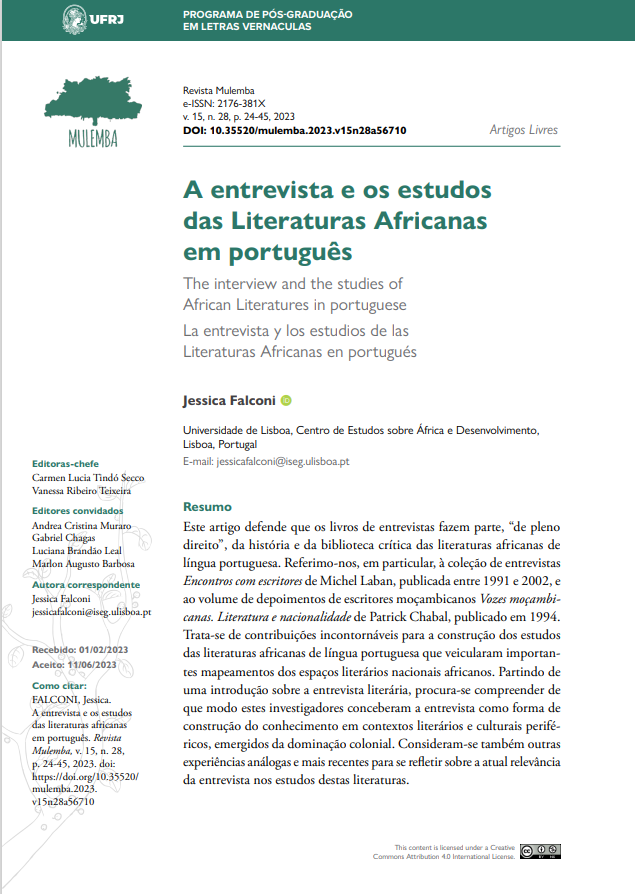
A Entrevista e os Estudos das Literaturas Africanas em Português
Abstract:
This article argues that interview books are a “full right” part of the history and critical library of Portuguese-language African literature. We refer, in particular, to the collection of interviews “Encontros com Escritores” by Michel Laban, published between 1991 and 2002, and the volume of testimonies by Mozambican writers “Vozes Mozambicanas. Literature and nationality by Patrick Chabal”, published in 1994. These are unavoidable contributions to the construction of studies of Portuguese-language African literatures that conveyed important mappings of African national literary spaces. Starting from an introduction to the literary interview, we seek to understand how these researchers conceived the interview as a way of building knowledge in peripheral literary and cultural contexts, emerging from colonial domination. Other similar and more recent experiences are also considered to reflect on the current relevance of interviews in studies of these literatures.
Quotation:
FALCONI, J. A entrevista e os estudos das literaturas africanas em português. Revista Mulemba, v. 15, n. 28, p. 24-45, 2023. doi: https://doi.org/10.35520/mulemba.2023.v15n28a56710

História de São Tomé e Príncipe de Meados do Século XIX ao Fim do Regime Colonial (1852-1974): As plantações, economia, cultura e religião
Abstract:
This book explains the reasons that led the Portuguese to recolonize the São Tomé and Príncipe islands from 1852 onwards and the strategies they adopted to institutionalize the new colonial order in the archipelago. They removed the natives from ownership of land and institutions and introduced the plantation economy model around which all economic and social life began to revolve, with the territory being divided between the populations of large plantations and the native populations. Work and land were exploited to the point of exhaustion, with mistreatment, racial discrimination, and a progressive decline in soil productivity. The production crisis emerged and exposed the limits of the plantation economy model. There were several attempts to forcefully hire native labor, which generated many conflicts and led to the “Batepá” massacre of 1953. This event raised the awareness of nationalists for the independence of the archipelago, which occurred on July 12, 1975. The book also addresses culture and religion as central elements that shape São Tomé and Príncipe society and identity.
Quotation:
Espírito Santo, A. (2023). História de São Tomé e Príncipe – De Meados do Século XIX ao Fim do Regime Colonial (1852-1974): As plantações, economia, cultura e religião. Lisboa: Nimba Edições.
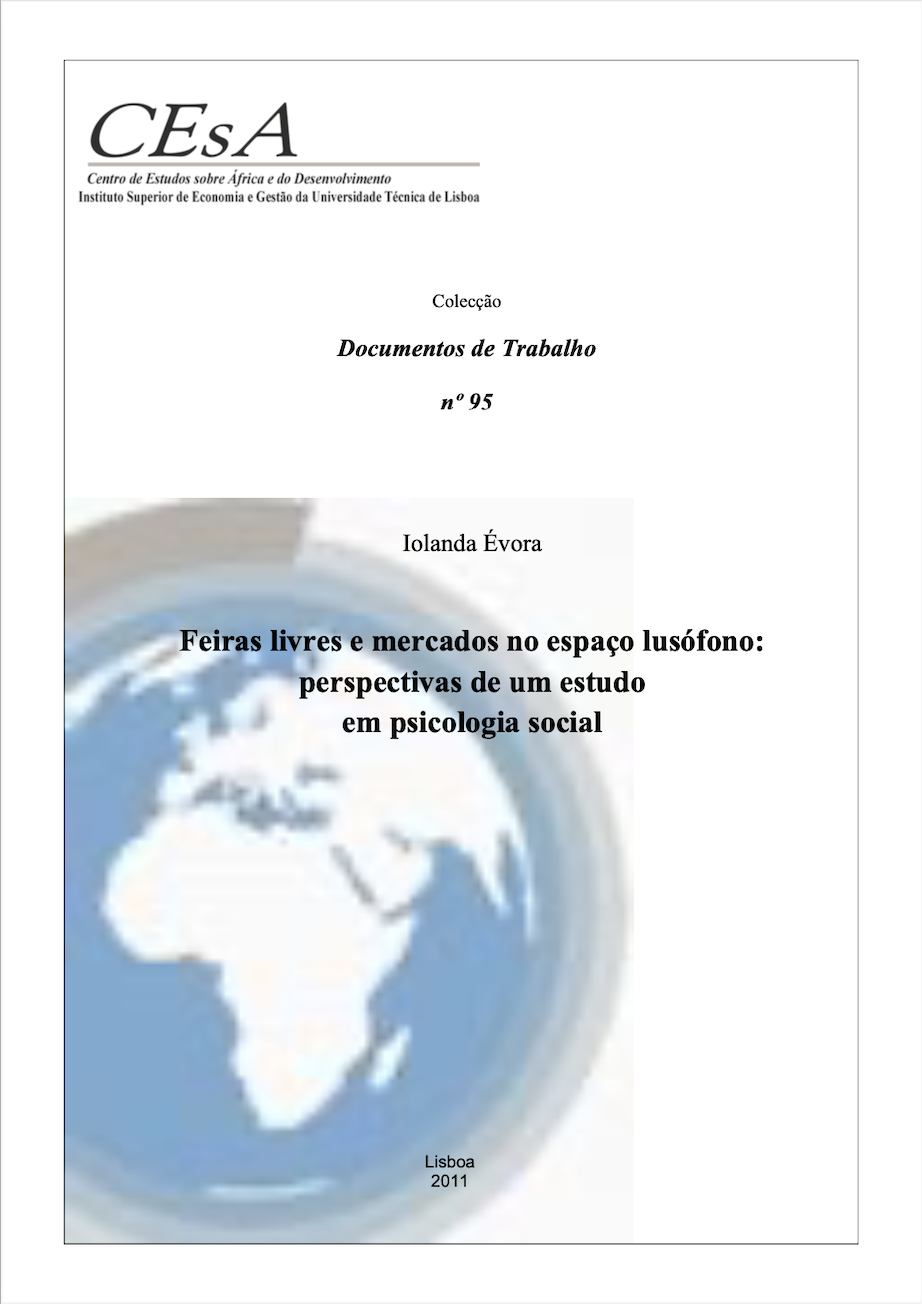
Working Paper 95/2011: Feiras Livres e Mercados no Espaço Lusófono: Perspectivas de um estudo em psicologia social
Abstract:
This communication proposes a reflection on the research methods to be applied in the study “Feiras Livres e Mercados no Espaço Lusófono: Perspectivas de um estudo em psicologia social”. The interest in the field is due, in the first place, to the type of study to be carried out and to the singularities of the proposed project, such as the fact that it will be carried out in the cities of Bissau, Praia and São Paulo, involving researchers from different areas of science and propose a field work with the subjects. Fairs and markets constitute the empirical objective of this study, presenting themselves as important universes of human activity and survival that mark the urbanity of capitals in the Portuguese-speaking space. The aim is to study the components and conditions for building a work base that will enable workers in markets and fairs to generate income through work in micro-enterprises. The study must identify and describe the material and psychosocial conditions that made it possible to become a worker in these free markets, building and acquiring the knowledge to be included in this work activity.
Quotation:
Évora, Iolanda. 2011. “Feiras Livres e Mercados no Espaço Lusófono: Perspectivas de um estudo em psicologia social”. Instituto Superior de Economia e Gestão – CEsA Documentos de Trabalho nº 95-2011.
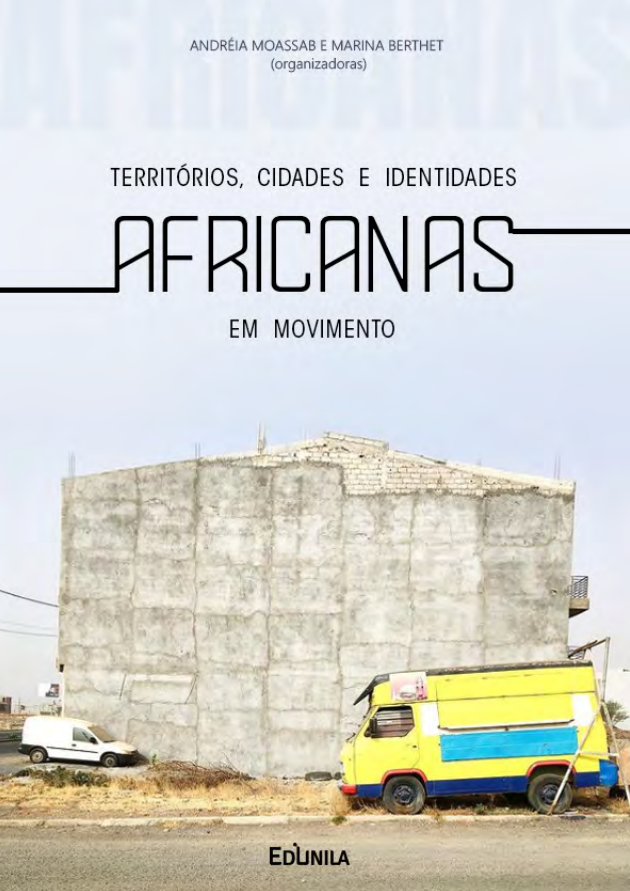
Hip-hop em Cabo Verde: rap e representação do espaço público na cidade da Praia
Abstract:
In Hip-hop em Cabo Verde: rap e representação do espaço público na cidade da Praia, the author studies how, despite the strong link with Portugal and the existence in that country of numerous rap groups composed of Cape Verdeans or descendants of Cape Verdeans, the hip-hop produced there is practically ignored and very little consumed by young people, particularly those from the periphery, to the detriment of the culture of North American black ghettos, known through the audiovisual flows of the digital era. Young people all over the world are seen as a risk factor, an association that is particularly patent in the modern discourse on security, especially in an era in which a part of young people associate themselves with street gangs, revealing “the failure of the expected reproduction of the support mechanisms of an expansive and optimistic capitalism”, which provides the so-called “Welfare State”. Thus, in the face of a feeling of juvenile unease, evidenced in some actions that destabilize the social order and the “Creole morabeza”, it becomes mandatory that the institutions that protect this population layer control them, reprogramming them institutionally, thus building a State Social Service.
Quotation:
Lima, R.W. (2022). Hip-hop em Cabo Verde: rap e representação do espaço público na cidade da Praia: In Territórios, cidades e identidades africanas em movimento. Andréia Moassab, Marina Berthet (Orgs.), 119-133. Foz do Iguaçu: EDUNILA, 2022. ISBN: 978-65-86342-32-1
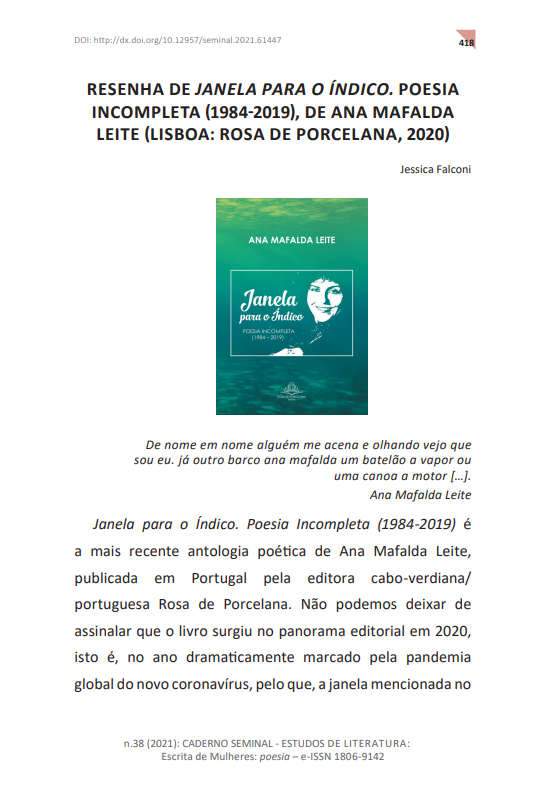
Resenha De Janela Para O Índico. Poesia Incompleta (1984-2019), De Ana Mafalda Leite
Abstract:
Resenha de Janela para o Índico. Poesia Incompleta (1984-2019) focuses on the most recent poetic anthology by Ana Mafalda Leite, published in Portugal by the Cape Verdean/Portuguese publishing house Rosa de Porcelana. We cannot fail to point out that the book appeared on the publishing scene in 2020, that is, in the year dramatically marked by the global pandemic of the new coronavirus, so the window mentioned in the title acquired an even more suggestive sense of freedom and openness. The anthology is organised into nine sections, which correspond to the books previously published by the author, from which a wide and careful selection was made, and a section with two unpublished texts. Thus, this Window witnesses a path of thirty-five years of poetic writing. A journey that is parallel to an equally long and consolidated career as a teacher and scholar of literature and cinema from the five Portuguese-speaking African countries. It is worth mentioning that Ana Mafalda Leite’s poetic writing has been the object of growing appreciation and recognition by the critics and the public. Her poetic texts have been included in various academic publications – in addition to anthologies and literary magazines – such as Itinerâncias and Vozes femininas de África, among others. In 2015 she was awarded the Femina1 prize for her poetic production, and in 2011 her poems were translated into English and published in the volume Stained Glass. Poetry from the Land of Mozambique, organized by Luís Rafael Mitras. It should also be noted that a selection of poems, from Janela para o Índico, will soon be published in Italian translation, on the initiative of Roberto Francavilla.
Quotation:
Falconi, J. (2021). Resenha De Janela Para O Índico. Poesia Incompleta (1984-2019), De Ana Mafalda Leite, Caderno Seminal 38.1, p. 418-443

Literatures and Cultures of the Indian Ocean
Abstract:
Portuguese Studies is a biannual multi-disciplinary journal dedicated to research on the cultures, literatures, history, and societies of the Lusophone world. Ana Mafalda Leite, Elena Brugioni, and Jessica Falconi were the organizers of this issue of the journal, Literatures and Cultures of the Indian Ocean. The president of the Editorial Board for 2021 is Catarina Fouto, and the Journals editor is Emanuelle Rodrigues Dos Santos. The journal is published by the Modern Humanities Research Association (MHRA), an international organization with members in all parts of the world. The aim of the Association is to encourage and promote advanced study and research in the field of modern humanities. It is concerned to break down barriers between scholars working in different disciplines and to maintain the unity of humanistic scholarship in the face of increasing specialization. The present volume results frorn the scholarly work conducted by members of the research project NILUS — Narratives Ofthe Indian Ocean in the Lusophone Space. The main purpose of the project consisted in establishing a theoretical and disciplinary connection between Lusophone Literary, Visual and Cultural Studies and the transdisciplinary field Of Indian Ocean Studies. The project on the written and visual narratives hailing from, or related to, the territories formerly colonized by Portugal along the Indian Ocean, specifically Mozambique, Goa, and East Timor. This volume, therefore, constitutes an attempt to bridge a significant critical and disciplinary gap, motivated by an almost total lack of dialogue among the above-mentioned fields of study. This lack of dialogue becomes ever more apparent if we bear in mind the increasingly central role played by historical, anthropological, literary, and cultural studies of the Atlantic Ocean in addressing colonial and postcolonial cultural and identity-related outputs and relations from the territories that Out Of Portuguese colonial rule. Consider, for instance, the influence of the notion of Brown Atlantic (Atlântico Pardo), de,’eloped by the anthropologist Miguel Vale de Almeida as a counterpoint to Paul Gilroy’s Black Atlantic, or the use of the Portugal -Brazil-Angola triangulation in comparative and transnational- oriented literary and cultural studies.4
Quotation:
Leite, A.M.; Brugioni, E. & Falconi, J. (2021) (eds). “Literatures and Cultures of the Indian Ocean”, Portuguese Studies 37.2.

Enchanted Things to Narrate the Oceans: João Paulo Borges Coelho and Luís Cardoso
Abstract:
Enchanted Things to Narrate the Oceans: João Paulo Borges Coelho and Luís Cardoso stems from the research developed under the NILUS project and, in particular, falls within the research strand that explored the role of material culture and materiality in contemporary narratives of the Lusophone Indian Ocean. The paper focuses on the short story ‘O Pano Encantado’ (2005) by João Paulo Borges Coelho and the novel Requiem para o Navegador Solitário (2007) by Luís Cardoso – two narratives set in island spaces, the small island of Mozambique and the island of Timor, respectively. It aims to validate the hypothesis that the appeal to material culture and materiality offers a way of narrating and remembering (in) the Indian Ocean from different shores of its range. The article was produced for the Modern Humanities Research Association (MHRA), an international organization with members in all parts of the world. The aim of the Association is to encourage and promote advanced study and research in the field of modern humanities. It is concerned to break down barriers between scholars working in different disciplines and to maintain the unity of humanistic scholarship in the face of increasing specialization.
Quotation:
Falconi, J. (2021). Enchanted Things to Narrate the Oceans: João Paulo Borges Coelho and Luís Cardoso. Portuguese Studies, 37(2), 224–241. https://doi.org/10.5699/portstudies.37.2.0224
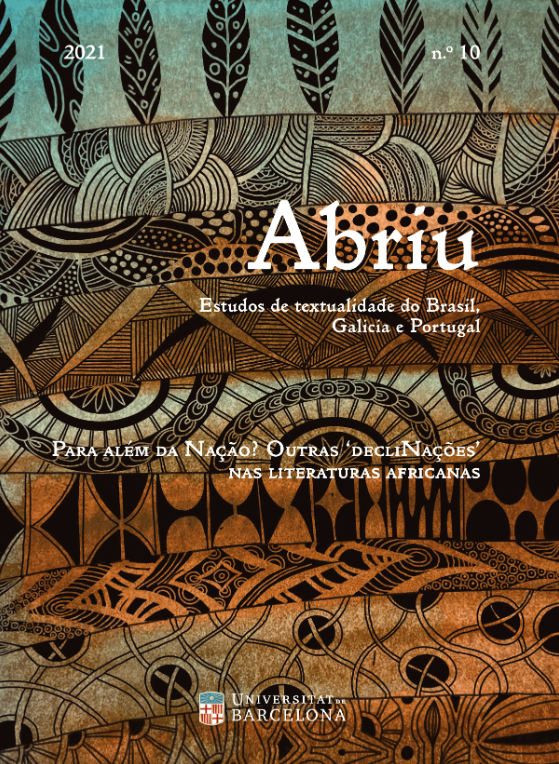
Beyond Nationhood: Other ‘Declensions’ in African Literatures
Abstract:
In the last two decades, Portuguese-speaking African literature, as a field of critical inquiry and object of academic study,1 has been undergoing a great expansion, with numerous dissertations, monographs, conference proceedings, special issues of journals, and articles produced in several countries. The article Beyond Nationhood: Other ‘Declensions’ in African Literatures traces the evolution of the national perspective in the studies of Lusophone African Literatures from the 1980s to the present. Based on a selection of collective and individual publications, as well as highlighting impor tant academic events for the area, the article seeks to identify lines of continuity and moments of rupture in the approach of these literatures based on the idea of Nation as a critical category and unity of analysis, from the consolidation of the link between literature and national independence affirmed after decolonization until the reception of post-colonial theories which occurred in the mid-1990s. Also, the article looks at the theoretical and disciplinary articulations between African Literature, Postcolonial Studies, Indian Ocean Studies and Comparative Litera tures, to provide a possible mapping of the most recent approaches that seek to build new critical cartographies for the studies of these literatures.
Quotation:
Falconi, J. (2021). Beyond Nationhood: Other ‘Declensions’ in African Literatures. Abriu: Estudos De Textualidade Do Brasil, Galicia E Portugal, (10), 9–38. https://doi.org/10.1344/abriu2021.10.1

Literatura colonial de autoria feminina: O Último Batuque, de Maria do Céu Coelho
Abstract:
Portuguese colonial literature written by women has received little attention in Lusophone literary and cultural studies. The most relevant exception, in this regard, is the case of Maria Archer, author of a significant number of fiction and non-fiction texts of colonial setting and theme that have received diverse readings and analyses. In particular, Ferreira’s works on women’s authorship writing and the connections between gender, nation and empire were pioneers in approaching this production according to an integrated theoretical framework, capable of illuminating material and symbolic transits and identity reverberations between nation and empire, in line with the paradigms of colonial and feminist historiography of the 1990s. Literatura colonial de autoria feminina: O Último Batuque, de Maria do Céu Coelho, aims to deepen and broaden the knowledge of Portuguese women’s writing on colonial themes, by providing a reading of the book O último batuque (1963) by Maria do Céu Coelho, published in Mozambique in the early 1960s. It is a singular work, for focusing on the eminently masculine topic of hunting from a woman’s perspective, and also for being a hybrid book that combines memorialistic writing and short novellas about the rural universe of colonial Mozambique. The paper discusses some of the essential characteristics of Portuguese colonial literature, as it has been conceptualized by several authors in previous studies. Resorting also to the vast literature on the articulations between gender, empire, and colonialism, the article seeks to equate the author’s position in the corpus of colonial literature, as well as to reflect on how her literary writing articulates race and gender.
Quotation:
Falconi, Jessica (2021) “Literatura colonial de autoria feminina: O Último Batuque, de Maria do Céu Coelho,” Portuguese Cultural Studies: Vol. 7: Iss. 1, Article 4.





